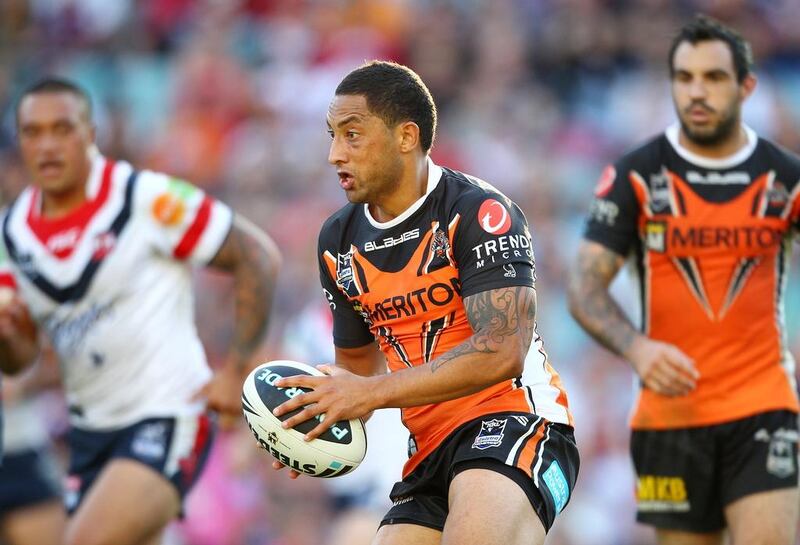Reuters
Rugby union and league may share a common background yet the intricacies of the game take a lot longer to learn than many expect as high profile Auckland Blues recruit Benji Marshall found to his and the New Zealand Rugby Union’s cost.
The 29-year-old Marshall called time on his short foray into the 15-man code on Monday and was released from his lucrative contract on Wednesday after only eight games, and 212 minutes, of Super Rugby for the under-performing Blues.
To his credit, Marshall was astute enough to realise that his style of play did not suit the more cramped playing field in rugby. In league, he was able to drift across the field and then try to sidestep through gaps in the defensive line.
In the 15-man code, which has adopted some of rugby league’s defensive systems, players need to run straighter and try to commit front on defenders to create space, something Marshall was unable to adapt himself to.
“The reality of it all is I was finding it hard to change my habits from league,” Marshall, who was on a reported NZ$480,000 (Dh1.5m) salary, said at his farewell media conference.
“A lot of those habits are quite lateral. Rugby you have to be square. I was finding that quite difficult, especially at 10 (flyhalf).”
Marshall’s decision to walk away from union met with a mixed reaction from pundits and local media. Some felt the player had failed, others put the blame on Blues coach John Kirwan for not giving him enough playing time.
In reality, the former league playmaker probably did not give himself enough time to truly learn the game - as evident by the eventual success of Brad Thorn and Sonny Bill Williams in the sport when they helped the All Blacks win the 2011 World Cup.
Both took time to find their feet in the 15-man code.
Thorn, who played 130 games for the NRL’s Brisbane Broncos, initially turned down advances by the All Blacks because he did not feel comfortable in union.
He played for the All Blacks at the 2003 World Cup though he was not wanted by new coach Graham Henry in 2004 and returned to league in 2005 to play another 70 games for the Broncos before he swapped again and became a mainstay in the team under Henry.
Thorn’s transition was helped that he played in the forwards and the core skills he required in both sports involved contact either with the ball in hand or tackling, though his strength and technical proficiency in scrummaging won him plaudits from rugby union coaches and tighthead props alike.
Williams, despite his freakish athleticism, took two seasons to get accustomed to union with Toulon and was only a bit-part player during the 2011 World Cup before his Waikato Chiefs form in 2012 catapulted him into the ‘automatic selection’ category.
The 2013 NRL winner will return to the Chiefs next year in an attempt to make his way back into the All Blacks, though attention will be heavily focussed on whether he can rediscover that form in union having spent two years playing league.
Marshall’s struggles were no more evident in the flyhalf role than last week against the Wellington Hurricanes when he was too lateral and did not challenge the defensive line.
Kirwan suggested he drop down to provincial level with Auckland to learn the game and be better prepared for 2015, but Marshall, with stated goals of trying to be a dual international within 12 months, felt he did not have the time on his side.
“The reality is the age I tried to do it means it wasn’t easy at all,” Marshall said. “I couldn’t change those habits. That’s a big part of why I struggled on the field.
“I could have gone on down the club rugby path and tried to change my habits and be as good as I can be.
“We don’t have that time and we both weren’t getting what we wanted out of this deal and that’s a major factor in how it’s got to where we are.”
Follow us on Twitter @SprtNationalUAE





